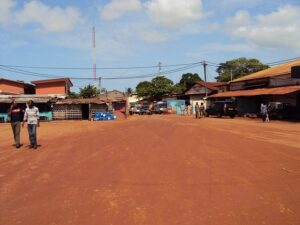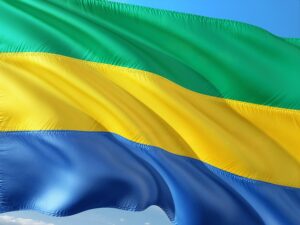Investing as an expat in Gabon combines strong natural-resource opportunities with strict regulatory and currency controls. Gabon offers access to hydrocarbons, mining, and timber, a euro-pegged CFA franc, and investor-friendly special economic zones.
At the same time, expats must manage foreign-currency restrictions, shifting regulations, land-title complexities, and compliance requirements in sensitive sectors like forestry and extractives.
This article covers:
- Investing in Gabon
- Gabon Immigration and Residency
- Expat Taxes in Gabon
- Company Ownership in Gabon
- Buying Property in Gabon
Key Takeaways:
- Gabon offers euro-pegged currency stability and resource wealth.
- Gabon does not have a golden visa program.
- Corporate tax is 30%, VAT is 18%, and profits can be repatriated once taxes are cleared.
- Foreigners can own firms and property, but land purchases need officially titled plots.
My contact details are hello@adamfayed.com and WhatsApp +44-7393-450-837 if you have any questions.
The information in this article is for general guidance only. It does not constitute financial, legal, or tax advice, and is not a recommendation or solicitation to invest. Some facts may have changed since the time of writing.

Why Invest in Gabon
Gabon lies in Central Africa, and uses the Central African CFA franc (XAF), a currency issued through the Bank of Central African States (BEAC) and pegged at approximately 655.957 XAF per euro.
This peg delivers a level of currency-stability uncommon among many sub-Saharan African markets, which can make cash-flow projections and repatriation planning more reliable.
Gabon is a member of the Central African Economic and Monetary Community (CEMAC), a zone that houses shared regulatory frameworks for banking, foreign-exchange flows and economic policy.
For an expat investor this matters because the regulatory context is not wholly local. It is shaped by regional bodies, meaning policy shifts somewhere else in CEMAC may influence your operating conditions in Gabon.
While historically dependent on oil and gas, Gabon’s government is actively pursuing economic diversification.
Significant investment is occurring in sectors such as timber and wood-processing, mining of gold, manganese and rare earths, agribusiness, infrastructure and light manufacturing, especially via the flagship special economic zone at Nkok.
Expats have the choice of legacy sectors like oil and gas, with higher barriers to entry but large scale. Other options are new economy sectors such as manufacturing, processing, and ecotourism, with potentially lower capital thresholds and more favorable incentives.
Does Gabon have a golden visa?
No. Gabon does not offer any Golden Visa or residence-by-investment program, either formally or informally. Residency and work rights are still tied to employment, incorporation, or concession activity, not passive investment.
Unlike Mauritius or Cape Verde, Gabon’s immigration framework has no legal category for residence by investment, nor any permanent-residence path granted solely for capital inflows, property ownership, or government-bond purchases.
All residence permits stem from one of three legal bases:
- Employment-based residence: the most common, tied to a valid work permit and renewable annually.
- Business-ownership residence: available to directors or shareholders of locally incorporated companies who can prove ongoing commercial activity and compliance with tax and CNSS obligations.
- Family-based residence: granted to spouses or dependents of legal residents.
Incorporation or concession route (the closest equivalent)
Foreign investors who establish a Gabon-registered company or hold a government concession can obtain multi-year residence cards tied to their business operations. However:
- The residence right lapses if the company ceases activity or fails to meet tax filings.
- There is no automatic path to permanent residence or citizenship through this channel.
- Immigration authorities require annual proof of economic substance (bank statements, tax clearance, payroll records).
Gabon citizenship and long-term stay
Gabon’s nationality law is restrictive. Citizenship is possible only by naturalization after ten years of continuous legal residence, good conduct, and proof of integration (including French proficiency).
Dual nationality is not generally recognized unless waived by presidential decree.
Taxation in Gabon

Gabon’s corporate income tax (CIT) is levied at 30% for resident companies.
Non-resident entities earning Gabon-source income without a permanent establishment are subject to withholding tax, generally 10–20%, depending on the nature of the income (dividends, royalties, services).
Certain sectors such as oil, gas, and mining have bespoke fiscal regimes under their respective codes.
The standard VAT rate is 18%. Companies within SEZs are often exempt from VAT on imports and local purchases related to their export operations.
VAT registration is mandatory for businesses exceeding the turnover threshold set by the annual Finance Act.
Under CEMAC foreign-exchange regulations, foreign investors may repatriate profits, dividends, and capital gains after fulfilling tax obligations.
However, transfers must be made through a licensed local bank and supported by documentation proving that all taxes have been paid and the funds originate from legitimate activities.
Delays usually arise from incomplete paperwork rather than denial of transfer rights.
Gabon does not maintain an extensive network of double-taxation treaties. Investors should verify whether their home country offers unilateral relief or exemptions for Gabon-source income.
Without a treaty, the standard withholding and domestic tax rates apply.
Companies must file annual financial statements and tax returns with the Direction Générale des Impôts (DGI).
Audits are mandatory for large entities or those with foreign participation. BEAC regulations also require annual declarations of foreign investments exceeding certain thresholds.
Are there tax incentives in Gabon for foreign investors?
Eligible investors may access tax holidays for up to ten years in SEZs or priority industries.
There are also accelerated depreciation for industrial and agricultural equipment, as well as reduced customs duties on imports tied to investment projects.
Gabon Nkok Special Economic Zones (SEZs)
Gabon’s Nkok Special Economic Zone (GSEZ), near Libreville, is the flagship for foreign investment.
Operated as a joint venture between the Gabonese state and private developer Arise IIP, it offers simplified registration, customs exemptions, and corporate-tax holidays for qualified investors.
Other SEZs, such as those in Port-Gentil and Franceville, follow similar models.
SEZ benefits typically include:
- Exemption from import duties and VAT on equipment and raw materials.
- Reduced corporate-tax rates for a set number of years.
- Accelerated processing for business permits and work visas.
- Integrated logistics, utilities, and warehousing facilities.
Outside SEZs, Gabon provides incentives under the Investment Charter and annual Finance Acts.
These may include reduced CIT rates, tax credits for local employment, or customs exemptions on industrial equipment. However, incentive regimes change frequently, so expats should confirm terms in writing with ANPI before committing capital.
For more thorough guidance, please consult a local tax attorney or expat financial advisor.
Does Gabon allow foreign corporate ownership?
Gabon allows 100% foreign ownership of companies across most sectors, with minimal restrictions on repatriation for investors who comply with regional foreign-exchange documentation.
Business registration is handled through the Agence Nationale de Promotion des Investissements (ANPI-Gabon), which operates a “one-stop shop” system aimed at cutting bureaucratic delays.
The most common legal entities are:
- SARL (Société à Responsabilité Limitée) — the Gabonese equivalent of a limited liability company. It requires at least one shareholder and one director, with a minimum share capital of XAF 1 million. This is typically the preferred structure for small to medium-sized enterprises.
- SA (Société Anonyme) — a public limited company requiring at least one shareholder and a board of directors. Minimum share capital is XAF 10 million. This structure suits larger ventures or joint ventures with local or foreign partners.
- Branch or representative office — foreign companies can register a branch, though it lacks separate legal personality and all liabilities flow back to the parent. Representative offices are used for market exploration but cannot conduct commercial activity.
Expats generally enter Gabon either by:
- Direct incorporation, setting up a wholly owned company to operate in-country;
- Equity participation, buying shares in an existing local enterprise; or
- Public-private partnerships (PPPs), especially for infrastructure and resource projects.
Each path requires due diligence on licensing, sectoral restrictions, and repatriation rights. The safest route is to engage a local legal and tax adviser familiar with OHADA commercial law, which governs Gabon and the broader Central African region.
Can foreigners own property in Gabon?
Foreign nationals can legally own property in Gabon, but in practice, land acquisition is highly regulated and often complicated by state ownership and bureaucratic inefficiencies.
Most land in Gabon is classified as state-owned, and private ownership is limited to parcels that have been officially titled under the titre foncier system.
Because registration and titling procedures are slow, many investors prefer long-term leases or concessions rather than outright purchase.
Gabon’s land law:
- Public domain land – owned outright by the state and cannot be sold or leased privately.
- Private domain land of the state – can be leased or allocated through concessions, subject to government approval.
- Private land – held by individuals or companies with a registered titre foncier, which establishes full ownership rights.
Expats must ensure that any purchase or lease is backed by a properly registered titre foncier, verified at the Direction Générale des Domaines. Transactions not properly recorded risk future disputes or nullification.
Can foreigners open a bank account in Gabon?
Foreign investors can open both corporate and personal accounts in Gabon’s major banks, including BGFI Bank, UBA Gabon, and Ecobank. A local account is required for company registration and tax payments.
Expats should maintain:
- A local XAF-denominated account for operating expenses and local transactions.
- A foreign-currency account (usually in euros or USD) for receiving remittances or handling repatriations, subject to BEAC approval.
However, strict documentation is required. Banks must justify every cross-border transaction with invoices, tax clearance certificates, or proof of service delivery.
Since CEMAC’s 2018 foreign-exchange reform, all international transfers must pass through an authorized intermediary (a local bank). Outflows such as dividends, loan repayments, or management fees must be accompanied by:
- Proof of tax compliance and profit declaration.
- Supporting contracts and invoices.
- Investment registration certificate (for initial capital inflows).
Transfers below XAF 5 million are generally faster to process. For larger remittances, expect 2–4 weeks of clearance time depending on completeness of the documentation.
FAQs
Is Gabon a high risk country?
Gabon is generally considered a medium- to high-risk country for foreign investors.
While it offers strong opportunities in natural resources, risks stem from regulatory uncertainty, currency-control restrictions, political instability, and governance challenges.
For expats, these factors mean investments require careful due diligence, strong partners, and a clear understanding of regulatory and currency-movement rules.
What currency is used in Gabon?
The CFA Franc (XAF), which is pegged to the Euro and used by the Central African Economic and Monetary Community (CEMAC) zone.
What is the economic outlook for Gabon?
Gabon is an upper-middle-income country with significant natural resources. Recent growth has been driven by non-oil sectors, but the economy remains vulnerable to commodity price fluctuations and declining oil production.
Pained by financial indecision?

Adam is an internationally recognised author on financial matters with over 830million answer views on Quora, a widely sold book on Amazon, and a contributor on Forbes.



